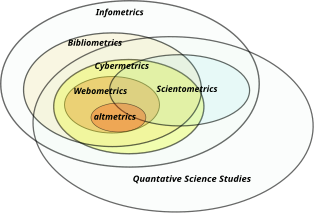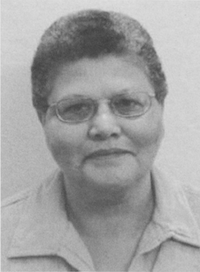Information retrieval (IR) in computing and information science is the task of identifying and retrieving information system resources that are relevant to an information need. The information need can be specified in the form of a search query. In the case of document retrieval, queries can be based on full-text or other content-based indexing. Information retrieval is the science of searching for information in a document, searching for documents themselves, and also searching for the metadata that describes data, and for databases of texts, images or sounds.

Information science is an academic field which is primarily concerned with analysis, collection, classification, manipulation, storage, retrieval, movement, dissemination, and protection of information. Practitioners within and outside the field study the application and the usage of knowledge in organizations in addition to the interaction between people, organizations, and any existing information systems with the aim of creating, replacing, improving, or understanding the information systems.
In the field of psychology, cognitive dissonance is the perception of contradictory information and the mental toll of it. Relevant items of information include a person's actions, feelings, ideas, beliefs, values, and things in the environment. Cognitive dissonance is typically experienced as psychological stress when persons participate in an action that goes against one or more of those things. According to this theory, when two actions or ideas are not psychologically consistent with each other, people do all in their power to change them until they become consistent. The discomfort is triggered by the person's belief clashing with new information perceived, wherein the individual tries to find a way to resolve the contradiction to reduce their discomfort.
In information science and information retrieval, relevance denotes how well a retrieved document or set of documents meets the information need of the user. Relevance may include concerns such as timeliness, authority or novelty of the result.
Gerard A. "Gerry" Salton was a professor of Computer Science at Cornell University. Salton was perhaps the leading computer scientist working in the field of information retrieval during his time, and "the father of Information Retrieval". His group at Cornell developed the SMART Information Retrieval System, which he initiated when he was at Harvard. It was the very first system to use the now popular vector space model for Information Retrieval.

Browsing is a kind of orienting strategy. It is supposed to identify something of relevance for the browsing organism. In context of humans, it is a metaphor taken from the animal kingdom. It is used, for example, about people browsing open shelves in libraries, window shopping, or browsing databases or the Internet.
A design engineer is an engineer focused on the engineering design process in any of the various engineering disciplines and design disciplines like Human-Computer Interaction. Design engineers tend to work on products and systems that involve adapting and using complex scientific and mathematical techniques. The emphasis tends to be on utilizing engineering physics and other applied sciences to develop solutions for society.
Bibliographic coupling, like co-citation, is a similarity measure that uses citation analysis to establish a similarity relationship between documents. Bibliographic coupling occurs when two works reference a common third work in their bibliographies. It is an indication that a probability exists that the two works treat a related subject matter.
Marcia J. Bates is Professor VI Emerita of Information Studies in the Graduate School of Education and Information Studies, University of California, Los Angeles.
Nicholas J. Belkin is a professor at the School of Communication and Information at Rutgers University. Among the main themes of his research are digital libraries; information-seeking behaviors; and interaction between humans and information retrieval systems. Belkin is best known for his work on human-centered Information Retrieval and the hypothesis of Anomalous State of Knowledge (ASK). Belkin realized that in many cases, users of search systems are unable to precisely formulate what they need. They miss some vital knowledge to formulate their queries. In such cases it is more suitable to attempt to describe a user's anomalous state of knowledge than to ask the user to specify her/his need as a request to the system.
In psychology, context-dependent memory is the improved recall of specific episodes or information when the context present at encoding and retrieval are the same. In a simpler manner, "when events are represented in memory, contextual information is stored along with memory targets; the context can therefore cue memories containing that contextual information". One particularly common example of context-dependence at work occurs when an individual has lost an item in an unknown location. Typically, people try to systematically "retrace their steps" to determine all of the possible places where the item might be located. Based on the role that context plays in determining recall, it is not at all surprising that individuals often quite easily discover the lost item upon returning to the correct context. This concept is heavily related to the encoding specificity principle.
Stephen Robertson is a British computer scientist. He is known for his work on probabilistic information retrieval together with Karen Spärck Jones and the Okapi BM25 weighting model.
Information behavior is a field of information science research that seeks to understand the way people search for and use information in various contexts. It can include information seeking and information retrieval, but it also aims to understand why people seek information and how they use it. The term 'information behavior' was coined by Thomas D. Wilson in 1982 and sparked controversy upon its introduction. The term has now been adopted and Wilson's model of information behavior is widely cited in information behavior literature. In 2000, Wilson defined information behavior as "the totality of human behavior in relation to sources and channels of information".
Collaborative information seeking (CIS) is a field of research that involves studying situations, motivations, and methods for people working in collaborative groups for information seeking projects, as well as building systems for supporting such activities. Such projects often involve information searching or information retrieval (IR), information gathering, and information sharing. Beyond that, CIS can extend to collaborative information synthesis and collaborative sense-making.

Elfreda Annmary Chatman (1942-2002) was an African-American researcher, professor, and former Catholic religious sister. She was well known for her ethnographic approaches in researching information seeking behaviors among understudied or minority groups.
Fuzzy-trace theory (FTT) is a theory of cognition originally proposed by Valerie F. Reyna and Charles Brainerd that draws upon dual-trace conceptions to predict and explain cognitive phenomena, particularly in memory and reasoning. The theory has been used in areas such as cognitive psychology, human development, and social psychology to explain, for instance, false memory and its development, probability judgments, medical decision making, risk perception and estimation, and biases and fallacies in decision making.
In psychology, confabulation is a memory error consisting of the production of fabricated, distorted, or misinterpreted memories about oneself or the world. It is generally associated with certain types of brain damage or a specific subset of dementias. While still an area of ongoing research, the basal forebrain is implicated in the phenomenon of confabulation. People who confabulate present with incorrect memories ranging from subtle inaccuracies to surreal fabrications, and may include confusion or distortion in the temporal framing of memories. In general, they are very confident about their recollections, even when challenged with contradictory evidence.
Temporal information retrieval (T-IR) is an emerging area of research related to the field of information retrieval (IR) and a considerable number of sub-areas, positioning itself, as an important dimension in the context of the user information needs.
Wilson's model of information seeking behaviour was born out of a need to focus the field of information and library science on human use of information, rather than the use of sources.

Lisa Mae Given is a Canadian-Australian information studies academic. She is currently Director, Social Change Enabling Capability Platform and Professor of Information Sciences at RMIT University in Melbourne, Australia. She is Editor-in-Chief of the Annual Review of Information Science and Technology.




